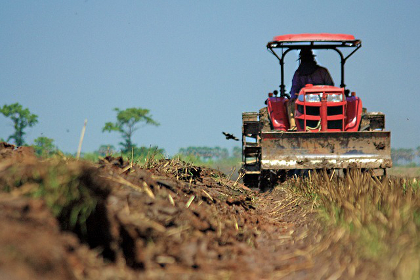
After a Century in Decline, Black Farmers Are Back and on the Rise
These Black farmers don’t stop at healthy food. They’re healing trauma, instilling collective values, and changing the way their communities think about the land.
May 10, 2016 | Source: AlterNet | by Leah Penniman, Yes! Magazine
A few years ago, while clearing dried broccoli stalks from the tired soil of our land at Soul Fire Farm in upstate New York, I received a cold call from Boston. On the other end was a Black woman, unknown to me, who wanted to share her story of trying to make it as a farmer.
Through tears, she explained the discrimination and obstacles she faced in a training program she’d joined, as well as in gaining access to land and credit. She wondered whether Black farming was destined for extinction. She said she wanted to hear the voice of another African-heritage farmer so that she could believe “it was possible” and sustain hope.
The challenges she encountered are not new. For decades, the U.S. Department of Agriculture discriminated against Black farmers, excluding them from farm loans and assistance. Meanwhile, racist violence in the South targeted land-owning Black farmers, whose very existence threatened the sharecropping system. These factors led to the loss of about 14 million acres of Black-owned rural land—an area nearly the size of West Virginia.
In 1982, the U.S. Commission on Civil Rights extrapolated the statistics on land loss and predicted the extinction of the Black farmer by the year 2000.
They were wrong. While the situation is still dire, with Black farmers comprising only about 1 percent of the industry, we have not disappeared. After more than a century of decline, the number of Black farmers is on the rise.
These farmers are not just growing food, either. The ones you’ll meet here rely on survival strategies inherited from their ancestors, such as collectivism and commitment to social change. They infuse popular education, activism, and collective ownership into their work.
And about that woman who called me from Boston? Years after we first spoke, I called her back. Turns out, she is still at it.
